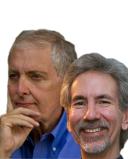Play
Is It Better to Be Lucky or Good? Research Has the Answer.
... although we typically get it wrong.
Posted June 20, 2016

An experiment that Lee conducted long ago, back when he was a young assistant professor speaks to some of the pressing issues of today. There were two participants in his study, one assigned by a coin flip to be the “questioner” in a laboratory version of a television quiz show similar to Jeopardy! The questioner’s job was to devise challenging trivia questions for the other participant, “the contestant,” to answer—with the provision that the questioner must know the answer himself. The questioners had little trouble coming up with challenging questions, on the order of “Who played the role of E. K. Hornbeck, a cinematic stand-in for H. L. Mencken, in the film version of Inherit the Wind?”; or “What Shakespearean play contains the soliloquy that begins, “If music be the food of love, play on?"1
Not surprisingly, the contestants did not perform well, answering an average of only two or three of the ten questions they were asked. More surprising, perhaps, were the contestants’ responses when they were later asked to rate their own and the questioner’s general knowledge, compared to the student body at large. The contestants came away with real doubts about their own level of general knowledge and were quite impressed with that of the questioner. What’s surprising about these reactions is that they ignore the obvious (once you think about it) stroke of luck enjoyed by the questioner: By virtue of nothing more than a flip of a coin, the questioner could restrict his questions to topics he happened to know something about; and his lack of knowledge about countless other topics could remain hidden.
Although the great advantage enjoyed by the questioner was there for any insightful person to discern, few did so.
And it wasn’t just the contestants who made this error: When the game show was shown to observers, they also thought that the questioner was unusually knowledgeable and intelligent—more so than the contestant, and more so than they themselves.
The lessons of that experiment are timely in a world of increasing economic inequality, with ever grander “winners” and an ever wider swath of people economically left behind. The ranks of those left behind will surely increase as advances in robotics and artificial intelligence lead to the further disappearance of jobs in a host of important sectors of the economy. With the advent of self-driving trucks, what will become of the 3.5 million drivers who make their living on our highways? What will we do with a surplus of lawyers once computers take over much of legal research that's now done by highly-paid staffers at large law firms?
Many people will inevitably lose their jobs through no fault of their own, but through simple bad luck. They will happen to be working in fields affected by technological changes that no one predicted at the time they entered those professions. Will society nonetheless look down at these individuals? Will it look admiringly at those who chose career paths that won’t be automated as quickly?
The lessons of Lee’s experiment are not encouraging. But an important new book aims to shift how we think about the role of luck in life: Success and Luck: Good Fortune and the Myth of Meritocracy, by economist Robert Frank. With a deft presentation of a great body of evidence, including a computer simulation of luck’s decisive impact in the most competitive environments, Frank shows just how crucial pure chance is to success in life. He also explains why it’s so hard for us to appreciate luck’s role in success and, quoting E.B. White, why “luck is not something you can mention in the presence of self-made men."
Frank goes on to show that people’s blindness to the influence of luck tends to make them less inclined to support investments required to maintain the public sphere—in education, scientific research, transportation infrastructure, and so on. He is also wise enough to know that telling people about the impact of luck in life is unlikely to make them suddenly support government expenditures to advance the public good.
But asking people about the role of luck in life can often do the trick: Nearly every successful person has a tale of how some random event—a connection to a particular mentor, a colleague’s recommendation, being in the right place at the right time—has contributed to their success. Telling these tales is clarifying, and makes people more appreciative, more grateful, and more in touch with their “best self.”
What’s your tale of luck’s influence in your life?
[1] 1. Gene Kelly; 2. Twelfth Night.


